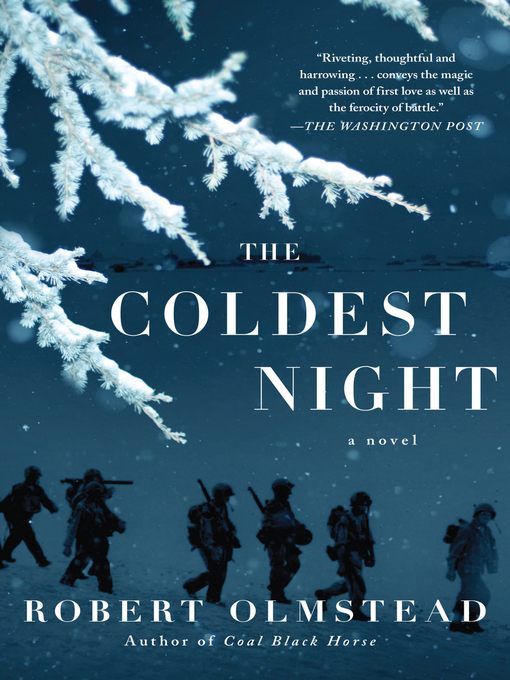
The Coldest Night
A Novel
فرمت کتاب
ebook
تاریخ انتشار
2013
نویسنده
Robert Olmsteadناشر
Workman Publishingشابک
9781616202699
کتاب های مرتبط
- اطلاعات
- نقد و بررسی
- دیدگاه کاربران
نقد و بررسی

Starred review from February 13, 2012
Olmstead’s (Far Bright Star) elegiac, gritty coming-of-age novel is presented in three dramatic sections: Part I finds 17-year-old Henry Childs living with his mother, a nurse, in Appalachia, W.Va., during the spring of 1950. His father largely absent, Henry excels at baseball and grooms horses. He falls in love with the fanciful Mercy, the older daughter of a dictatorial judge, and the two elope to New Orleans, where he works as a janitor until Mercy’s vindictive brother arrives to take her back. Part II begins with the heartbroken Henry enlisting as a Marine “hunter,” armed with the fierce Browning Automatic, and dispatched to Korea, where he participates in the savage and decisive Chosin Reservoir campaign in frozen northeastern Korea. Snippets of male banter help to leaven the hellish brutality endured by Henry and fellow sniper pal Lew, a veteran of WWII. One year later, Part III opens with the shell-shocked Henry, only a bit older but significantly transformed, returning home to W. Va. up the Kanawha River, where the pain of his mounting personal losses threatens to overwhelm his sanity. Despite the narrative’s darkening vision (“The Lord is a man of war,” says Henry), enough redemption rescues Olmstead’s powerful, desolate, and well-crafted novel from becoming oppressively bleak.

February 15, 2012
A combination of war novel and love story, this work follows Henry, a young man in 1950 West Virginia, as he falls for a wealthy young woman and runs away with her to New Orleans. When their affair is violently interrupted by her family, Henry enlists in the marines. The Korean War is raging, and Henry experiences an epic battle, gruesome wounds, and unforgettable horrors. Although the book is framed by a love affair, the heart of it--and where the narrative is most gripping--is Henry's experience in combat. Olmstead (Coal Black Horse) has a spare, direct style that is most effective in the brilliant, engrossing combat descriptions and ironic marine banter. In the West Virginia scenes, the clipped conversations of the characters are more noticeably stylized. VERDICT A novel of the early 1950s and the Korean War that will appeal to readers of literary fiction.--John R. Cecil, Austin, TX
Copyright 2012 Library Journal, LLC Used with permission.

February 15, 2012
It's extremes that rivet us in Olmstead's searing seventh novel: the heaven of first love; the hell of the battlefield. Henry Childs grew up in the mountains of West Virginia, raised by his grandfather and his sweet-natured mother Clemmie. (The mystery of his never-mentioned father is a late-revelation shocker.) His forebears were soldiers and horsemen, but they've lost their land, and Clemmie must move with Henry to the city, Charleston. In 1950 Henry is a high-school junior with a passion for horses and baseball. He helps out at some stables where he meets Mercy. She comes from money and is university-bound, while Henry seems headed for a factory. The attraction between these virgins is mutual and overwhelming; from the outset their sex is a rapt communication. Henry is warned off by her father and brother. The lovers elope to New Orleans, where an apartment is waiting for them, courtesy of Mercy's accommodating aunt. They make it their Eden. Father and brother come to expel them, abducting Mercy, giving Henry a final warning. Though underage, he enlists as a Marine and is sent to Korea. He does recon with Lew, a gruff World War II vet. Quite unsentimentally, a bond develops, a wise-guy routine. The cold is arctic. The Chinese come at night, waves of them. It's kill or be killed; answer atrocity with atrocity. In New Orleans we ached because we feared what was happening had to end; in Korea we ache because we fear it never will. Olmstead's extraordinary language gives us new eyes. An exceptionally fine study of love, war and the double-edged role of memory, which can both sustain and destroy. Prize-winning material.
COPYRIGHT(2012) Kirkus Reviews, ALL RIGHTS RESERVED.

























دیدگاه کاربران